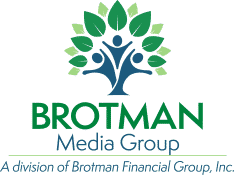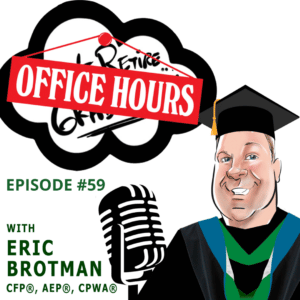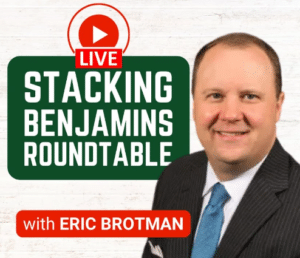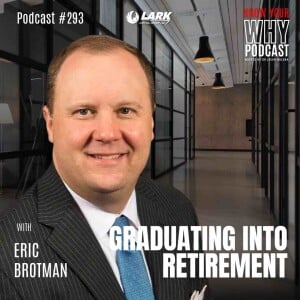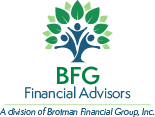In today’s Office Hours, Eric answers Jesse’s question: “What advice do you have for someone interested in a career in finance or as an advisor?”
The career path for a financial advisor is not well-defined, but there are several ways to get into the industry for a successful career.
Have a question? Post it in the comments, tweet it to us at @BrotmanPlanning, or post it on our Facebook and it may be used in a future episode of Office Hours!
[00:00:00] Eric Brotman: This is Eric Brotman, the host of don’t retire, graduate! The podcast that teaches you how to advance into retirement rather than retreating. We received a question from Jesse, and this isn’t personal finance or retirement readiness, so it qualifies as more. Jesse asked, “what advice do you have for someone interested in a career in finance or as an advisor?” And I can say, this is the first time we’ve gotten a question about the career, and so I’m really excited to talk a little bit about it with you, and, and I’ll answer your question. Starting a career in as a financial advisor is one of the more challenging careers to begin because there’s no obvious path. So if you wanna be a lawyer, you know, you can do pre-law or you can do undergraduate school and then go to law school. If you want to go be a doctor, you know what the path is, if you wanna be an accountant, you can get an undergraduate degree, you can sit for your CPA and, and there’s a path to do this. Unfortunately, in the financial planning arena, there isn’t one, one set of, of rules or one career path to do this. And historically, financial advising, it, it has been kind of like the wild west where people just, just join an organization and call themselves financial advisors, whether they have any acumen to do that or not.
I’m glad the pendulum’s swinging a little bit toward the CFP designation, which is the certified financial planner practitioner. And I do think that that is the, the best way to enter this career is to, to work on a CFP education. I would say that there are a number of different paths to get there and really what you’re going to want to do early in your career, especially if you’re coming straight outta school, is you need to work for an organization that does that type of work. So it might be an insurance company. It might be a brokerage firm. It might be a bank or a trust company, or it might be an independent financial planning and wealth management firm like ours, where you can come in and, and begin a career straight outta college. You do not need a finance degree or an economics degree or any specific undergraduate degree in order to enter this line of work. In fact, I studied English and psychology in undergraduate school, which is why I love to write and communicate and think and so forth. And I went back and did a Master’s in financial services years later. So it is not necessary for you to have a specific undergraduate major in order to be successful in this industry. I would say that there are two very different tracks though. One of them is what I’d call sort of a CFA track or a chartered financial analyst track. That’s for someone who wants to work for a mutual fund or wants to, to do research, picking stocks or picking various investment vehicles.
And then there’s the certified financial planner route, which is more along the lines of holistic planning and working with families and, and helping with decision making along the way in terms of personal finance. So they’re two very different careers. If you prefer the technical aspects of finance, then you really do benefit I think, from the undergraduate education in finance or something like it, because it is a skillset that requires a form, more specialization in analyzing the companies or the balance sheets or the, the, the math involved. On the planning side, a lot of it is, is really communicative, and so you have to be as good with people as you are with numbers. And so it, it really is a different skillset. In a company like ours, we have investment operations departments and insurance operations departments, and and we have advisors at various levels. And so it’s possible to be essentially an entry level associate advisor and what you don’t have to do in an organization like ours, which is partly what makes, I think, our place special is that you don’t have to sell anything to anyone.
You know, most of the time, if you enter a career as a financial advisor and you’re working with X Y Z company, whether it’s a, a bank or a brokerage or whatever, you pretty much have to sell or starve. You have to land clients and that’s not easy to do at 22. In fact, it’s not easy to do ever. So if you can find an organization where you can work with existing clients of the organization, or you can work with new, newly attracted clients to the organization, and you can really hone your skills and have a mentor and have somebody who will take you under their wing and teach you the things you need to know to be successful- I think that’s the best way to get into this career there is, and you know, it’s not an easy path, but it is something that I think you can benefit from those types of, of one- on- one relationships, with a mentor or, or somebody who can guide you. And so if you’re in school right now, if you’re a, a student and you’re contemplating this career, internships exist. And I would absolutely tell you to have a summer internship or a school year internship, get your foot in the door with a, a firm in your area and, and determine, first of all, do you like this? And second of all, is that someplace you could see yourself hanging your hat once you’ve tossed your cap and gown? If you’re already in the workforce and you’re thinking about changing careers, you really have to leverage your network in a different way. You certainly wouldn’t want to be an intern at that point, cuz you have to make a living. But you can absolutely leverage your network and talk to folks even at the firm potentially where you have your, your assets. If you’re, if you have a financial advisor, you can talk to them. And you can also get advice from some of the other professionals in your world: your estate attorney, your accountant and others. But Jesse, I hope I helped you. I, if you’re contemplating a career in finance or as a financial advisor, I, I can say for the right person, it’s the single greatest way to make a living that I’ve ever stumbled on and I’ve been doing this now 28 years and love it, so thank you for your question. I hope it was helpful. If you’d like to send us a question, which we might answer in a future episode of Office Hours, post it in our Facebook page, or tweet us @Brotmanplanning. If you like what you hear, please subscribe to our podcast and leave a rating on Spotify or wherever you listen to your favorite shows. Please also check out our books, workbooks, and online financial literacy resources at brotmanmedia.com. Thanks for coming to office hours. Be sure to tune in for new content every Thursday. For now, this is your host, Eric Brotman, reminding you: don’t retire, graduate.
[00:05:55] Narrator: Securities offered through Kestra Investment Services, LLC.
Kestra IS, member FINRA SIPC. Investment advisory services offered through Kestra Advisory Services, LLC. Kestra AS, an affiliate of Kestra IS. Kestra IS or Ketra AS are not affiliated with Brotman Financial or any other entity discussed.
